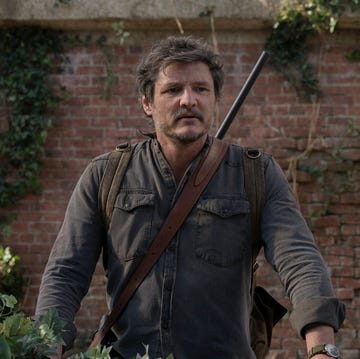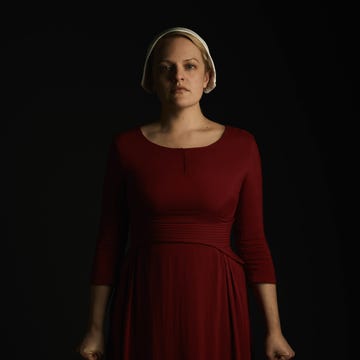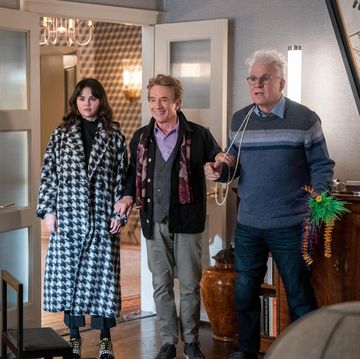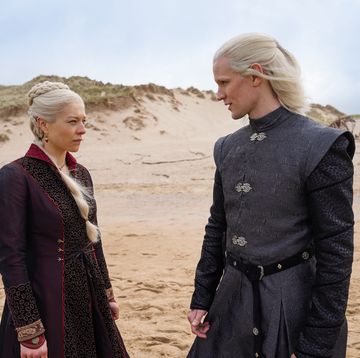Photographs: Magdalena Wosinska
Words: Farrah Storr, Alice Wignall, Katie O'Malley, Lotte Jeffs, Olivia Blair and Olivia McCrea-Hedley
Aside from our loved ones, they are the women who have had the biggest impact on our lives over the last year. From teaching our children and helping the homeless, to delivering food and being a friendly face in times of sorrow, essential workers have put their lives on the line to protect ours. But how have they fared over the last year?
As we mark 365 days since the UK went into its first official lockdown, we caught up with six women featured in our original ‘The Other Front Line’ feature to find out how life has changed for them during the Coronavirus pandemic.
Hannah Lane, 29, Bath, is a funeral director at Co-Op funeralcare
A year later, I didn’t think I’d still be telling grieving families they can’t hold wakes, hug their family at funerals or that only 30 people could come to say 'goodbye' to someone who was loved by so many.
Before Covid, I’d never really had to say ‘no’ to families. In my job, you say ‘yes’ as much as you can: ‘Of course, I can help you with that,’ ‘Of course, you can have 200 people at a funeral.’ Telling families all day ‘you can't do this or that’ doesn’t get any easier.
The funerals I’ve directed over the past year will stick with me. A lot of people who have lost loved ones over the past year haven’t had closure because they haven’t held wakes or gatherings. I lost three of my grandparents this year and I definitely feel I haven’t had closure. It’s been hard doing my job while it’s been mirrored in my personal life, but I still want to help people even when I’m grieving myself.
The busiest times at work happened in tandem with rising death rates, like this time last year and Christmas going into January 2021. During these periods, half of my funerals were for people who had passed away from Covid. We would be planning eight to 10 funerals per week, rather than our pre-pandemic average of five to six.
The toughest funerals, emotionally, have been those where nobody attended. This happened more at the beginning of lockdown when there was a lot of fear around the virus, with many families deciding not to attend at all to keep their family as safe as possible. It would be just me and the funeral celebrant or a minister. In those cases we’d ask the family what music they wanted played and I’d remain at the funeral until the final moment, when the coffin was lowered or curtain drawn.
In the last year, I’ve learnt how much my industry can adapt. With the smallest gestures you do, you get a lot of appreciation. For some funerals, we organised special routes for the procession, so the hearse can drive past the homes of friends and families, who line the streets and clap in lieu of attending the restricted ceremony. We’ve streamed a lot of our funerals too, and ahead of the service printed enough Order of Services for families to send to those watching online. I suppose it allows people to feel as close to actually being there as possible.
This time last year, I spent a lot of time reassuring families that I’d help organise memorial services to make up for the restricted funerals as soon as I could. Though I didn’t think this would be more than a year later, I’m really looking forward to helping them soon.
Angela Fernandez, 47, Croydon, is a community kitchen manager for Good Food Matters
Good Food Matters is a community garden and kitchen, and my job is to run courses to teach people how to make healthy meals for themselves. When the pandemic hit and we had to stop our usual activities we switched to using our facilities and resources to make meals for local people who were in need. Over the first lockdown we made and distributed around 5,000 meals.
As summer came around we were able to start thinking about opening up and running some workshops for local schools, but once they were arranged my excitement turned to anxiety. I love my job, it comes very naturally to me, and usually in the kitchen it’s very free-flowing and active. We pass things around, share things, smell things together. Suddenly we were having to think about guidelines, risk assessments, social distancing. I just had to decide: this isn’t going to be a barrier. The groups of kids we had in hadn’t been in school for four months, this was the first time they were seeing each other, so we wanted to make it fun. But it all came back so naturally. They were joking around, they were able to be free in the garden. It was a joy.
We also ran courses for young refugees and asylum seekers. With restrictions, their lives are very different. They’re usually very active, but a lot of that had gone. One of the people who came said it gave him something to get up for, and it became a really open space for them to discuss their lives and feelings, and give them a sense that they’d achieved something. It felt great to be able to do that.
But we knew another big lockdown was coming. Like a lot of small organisations, we have really struggled with funding and money and we’ve had to make the really hard decision to furlough ourselves for the time being. But we plan to open up again in the next few weeks and it has given us all time to think and reflect on how we want to move forward. We’re a small team anyway, but we’ve become very close over this year, and I’ve seen that everywhere. So many charities have pulled together and worked together and achieved some incredible things. It has been truly inspirational to see.
We’re so grateful that we are still here and surviving and I can’t wait for us to be able to open our gates and welcome people back, to be able to provide a space for them just to come and be with others. We’re still living through it at the moment, but I think it’s going to be afterwards that the true effects – physical, social, mental – will be felt. It’s important to reflect on what’s happened, to tell these stories. Society will be different. We can’t go back. But it’s how we go on. We have to use the positives to carry on. And to say to our communities: 'We’ll be here.'
Catriona Dolan-Lawson, 29, south London, is a school teacher
My mind is always full of questions. Year 11 shouldn’t be in this part of the school, where do they need to be? Which group are allowed in the canteen right now? Which room am I teaching in this afternoon? It’s a constant stream of thoughts, needing to know where everyone is at what time, making sure everyone is OK; that they’re safe.
Everything’s different now. There are so many rules. Students must stay in bubbles, masked-up with the windows open at all times. Teachers move between classrooms, to minimise the number of people in the corridors. We have a testing centre, with lab technicians and former teachers coming out of retirement to help. It’s complicated. It’s strange.
My pandemic ‘experience’ has been unusual. Whereas friends have worked from home, I’ve continued with my daily commute – the roads quieter than usual; the trains near-empty. While I’ve missed out on the lunchtime baking and daily strolls around the park, I also haven’t been climbing the walls, sick of working from my kitchen table. I realise how lucky I’ve been, being able to interact with people every day.
In a way, it’s shielded me from a lot of fear. Having to go into work hasn’t left me with much time to worry about catching Covid. I’ve been more focused on those around me: other teachers at school are far more at risk, and when I see these predictions on the news of what classrooms should look like – huge, open spaces – I worry, We can’t do that. You can’t just rebuild a school to be Covid-safe, but we’re doing the best we can.
Dealing with people’s perception of teachers has been difficult. The media has kept saying ‘schools are closed’, but that’s never been the case. Of course, I applaud parents for stepping up and guiding children as they learnt from home, but that didn’t mean we just stopped. For the children who still had to attend, school was always there for them. We were there for them.
It’s been over a year since we last came together as a school. Since we last had an assembly, put on a play or held a concert. I miss it so much. Everything is so carefully controlled that there’s no spontaneity anymore, no surprises. It’s so hard to keep that community spirit going when we’re all kept so far apart.
But it’s still there, in the little things: it’s seeing the joy in students reunited with friends after months apart; in the clover-adorned masks one teacher jokingly bought for the staff to wear on St Patrick’s Day; in witnessing the sheer resilience of this next generation.
This incredibly difficult year has changed them. I’ve noticed students showing a real interest in understanding and engaging with the world around them, and what they can do to help. How they continue to look forward and be positive encourages me to do the same. For now, we’ll get used to this ‘new normal’ but, thanks to them, I feel like the end is almost in sight. Because of them, I have hope.
Emily Deeley, 27, Torquay, is a Sainsbury’s Manager
I can only describe this as being the quickest slowest year I’ve ever experienced. I know that doesn’t quite make sense, but a lot about this year has not made sense. I have felt panic at the same time as great purpose; and felt comfortable whilst also being deeply uncomfortable. But most of all this year has made me realise just how tough I am, even when at times, I have felt very fragile.
Before Covid supermarket workers were a sort of invisible workforce. No one really noticed the job we did because we were always there. But this year we have gone from being seen as people who stack shelves to a workforce who helped feed the nation. In that way, Covid has helped change the public perception of what we do. Having a light shone on us, has given real meaning to this profession. Cashiers, who once upon a time you would barely notice, are now stopped and thanked for the work they do.
I’ll be honest, when the second lockdown happened my instant thought was: ‘I don’t know if I can go through this again.’ That first lockdown had felt relentless with no routine and certainly no sense of an ending. It brought back all those memories of the panic buying and standing at the supermarket doors to shepherd people carefully through and then finally, going home at night and crumpling under the sheer weight of it all.
But then I took a breath and looked back on what we had got through. How strong and brave we have all been. How we’ve all come together as colleagues. How the company I work for looked after us all from day one. We were all tested to our limits in those first few months, but in being tested I came to realise what I wanted out of my life.
Before Covid, I had always thought of myself as an anxious person. I wasn’t a risk taker. 2020 changed all that. Because of that sense of purpose I had felt through those first few months, I remember thinking that I wanted to feel like that all the time. I wanted to stretch myself in ways I hadn’t before and so a few months ago, with the help of my elder sister I started a delivery company, Hey Sweet Cheeks, making chocolate bars from scratch and sending them out across the country. I would never have done that before 2020.
Back in March finding myself on a frontline I had never prepared myself for was hard. But at the same time it revealed much about the world that, had this not happened I’m not sure I would have seen. That is to say the bravery of colleagues, the empathy of the public, but most of all the inner strength I never gave myself the credit for having.
Hannah Pratt, 28, south London, is a former delivery driver
I’d applied to become a delivery driver for Amazon Flex before the pandemic and was accepted just before we went into lockdown. At a time when the world was going inside, I felt fortunate I had a job that was getting me out of the house regularly and meeting people.
In the early days of the pandemic, customers were chatty and friendly, with some even leaving tips and thanking me for what I was doing. The interactions between driver and customer were frequent. But as the health crisis continued, face-to-face moments decreased as deliveries became part of everyday life. Life just became about surviving. I noticed people’s behaviour with their neighbours changed, too. At the beginning, most were happy to take packages for their neighbours if they were out. Gradually, this became less common.
At the peak of the health crisis, I was doing three to four deliveries a day. I’d wake up at 6am and automatically open the Amazon app to see if there were any shifts. Once I finished a job, I’d tap to find another. Most of the time the delivery slots were consistent, but I found some were more challenging than others. It was always Sod’s law that the customer who ordered packages of bottled water would be the one who’d live on the top floor of an apartment block, without a lift or car parking space outside. Delivering packages is physical work and some days can be incredibly tiring.
Driving through London’s empty streets at the start of the pandemic was weird but calming. During my deliveries, I’d often listen to the radio or Spotify but sometimes I found it peaceful to drive along in silence. I’ve always enjoyed driving but in lockdown it became a way to be alone with my thoughts.
I recently started a job at a jewellery company and finally understood what everyone means when they complain about Zoom fatigue or having a sore back from sitting at a desk all day. The best thing about being a delivery driver was having complete autonomy over my days. I found that when I was able to choose what I was doing I worked more and wasn’t bothered about how many hours I was putting in because I was in charge of my time.
The last year has taught me just how resilient humans are - we naturally learn to adapt. It’s reassuring to know this because it means that whatever happens in our lives in the future, we can be confident that we’ll just make it work. We’re all going to look back in years to come with our grandkids and realise just how much we’ve been a part of history.
Fortunately, the pandemic has meant that people have more appreciation for roles that may have previously been overlooked, whether it’s those carried out by office cleaners or litter pickers. As a former delivery driver, I’m not sure I’d consider myself a hero. Rather, there’s an argument to say we're all heroes, surviving.
Kathleen Sims, 38, is Head of Westminster and Outreach Lead at St Mungo’s homelessness charity
Lives have been saved, and lives have been changed. I don't think any of us could have predicted in March last year, that we would be sitting here with such great successes. People who have had long histories of rough sleeping are now sustaining accommodation and moving away from the streets completely.
My team of outreach workers have been so brave. They are like angels of the street, going out late at night and early in the morning to support people sleeping rough. During the pandemic, St Mungo’s helped almost 4,000 people who were rough sleeping to isolate safely in empty hotels, or other emergency accommodation.
When everybody else was told to work from home and the streets became derelict and deserted in April of 2020, we were out there. The people we found rough sleeping were petrified, because the streets didn’t feel safe anymore. It’s still harder to survive. When libraries close, when cafes close, when all of the places where your everyday needs are met close around you, then actually homeless people did have to make a decision to take help. And so, people who may have distrusted homeless services previously said, ‘no, actually, this is too tough now’.
One of the issues we’ve had to face since the first lockdown is that lots of people are stranded in this country who don't want to be here, but they don't have the money to be able to get a Covid test and travel. People who have experienced sleeping rough aren’t just people who bed down on a cardboard box in a doorway. There's lots of other forms of destitution. Relationship breakdown is one of the main reasons why people become homeless. And then it's around mental health and substance use, and other complex, individual reasons like bereavement or job loss, which can affect anyone from any walk of life. So, we’re waiting to see a whole new wave of people coming onto the streets because the pressure of lockdown has driven them there. The crisis is not over for our clients.
St Mungo’s has managed 30 hotels across London, the south and south-west, and we are pushing very hard for things to not just go back to how they were with homelessness in the capital. And to make sure that every person that's been temporarily housed in a hotel will have a safe, move on option. But we can only move people on if there's housing to move them on to and it needs to be affordable.
Because of the pandemic, and people seeking help, as well as having access to more temporary accommodation due to lack of tourists, we have currently got the lowest level of rough sleeping that this country has ever seen – this shows that ending rough sleeping can be achieved when we work together. This is our real opportunity to transform what this country looks like when it comes to the most vulnerable in society.
As outreach workers, it’s been great to be recognised for being on the frontline. When the teams were getting vaccinated, there was a buzz in the air that we were we were moving forward, there's light at the end of the tunnel.
My dad died in August. And I haven't been able to grieve. But I'm not alone. There's lots of people who have lost loved ones. I had a week off recently and that was my first real break, to just try and breathe. We, as a whole nation, have gone through this together. And I think that for the first time everybody is realising that there are ‘war wounds’. No one has come out of this unscathed.
Donate to St Mungo’s here. Listen to an interview with Kathleen and former St Mungo’s client Kerri here.
Like this article? Sign up to our newsletter to get more articles like this delivered straight to your inbox.
In need of more inspiration, thoughtful journalism and at-home beauty tips? Subscribe to ELLE's print magazine today! SUBSCRIBE HERE



















